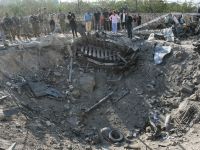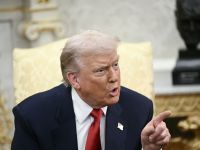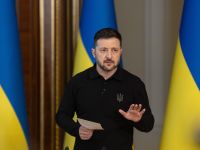Israelis were watching the US presidential election carefully Tuesday, with most siding with Democratic candidate Al Gore, but the Middle East death toll seemed set to mount regardless.
Israeli troops shot and killed two Palestinians in sporadic outbursts of violence in the West Bank and Gaza Strip on Monday, but the confrontations were limited and the intensity was markedly lower than in recent weeks.
In total, 182 people, most of them Palestinians, have been killed in a tide of violence triggered by a September 28 visit by Israeli hardline opposition leader Ariel Sharon to a Jerusalem holy place that is at the heart of the decades old Israeli-Arab conflict.
Later Monday the Israeli military announced that the Palestinians had opened a new line of attack, with an unsuccessful bombing attempt on an Israeli navy speedboat off the Gaza coast.
As the Palestinian death toll rose, Israeli Prime Minister Ehud Barak accused Palestinian leader Yasser Arafat of not doing enough to halt the weeks of bloodletting.
Barak also rejected calls for an international force in the occupied territories.
The Palestinian leadership said Monday it was asking the UN Security Council to send in such a force, which it earlier said should include up to 2,000 military observers in the territories that Israel captured in war 33 years ago.
"We see a certain effort by chairman Arafat to calm things down but the results show no real decrease in violence," Barak told reporters in parliament.
"This is an embarrassing and grave violation of the understandings and we need to act accordingly," he said, referring to a US-brokered truce at the Egyptian resort of Sharm el-Sheikh that has so far failed to quell the unrest.
Both leaders are set to hold talks with US President Bill Clinton in Washington this week; Arafat on Thursday and Barak, separately, on Sunday.
There was a growing feeling that these meetings would provide Clinton's last real chance to make some headway in the peace process which he has devoted so much time to during his eight years in office.
Both meetings will take place after Clinton's successor as president is announced, increasing the feeling of a lame duck presidency.
That feeling will be exacerbated if Republican candidate George W. Bush emerges victorious from Tuesday's vote.
"If George Bush is elected, Clinton will have lost what little authority he still has left. Al Gore's election would provide the president with another shot of political vitality which Clinton now desperately needs," the daily Haaretz newspaper said Monday.
Israelis were siding largely with Democratic candidate Al Gore, Clinton's vice president, while the Palestinians were expecting nothing good no matter who takes the helm of Israel's main ally.
Bush and Gore have both been trying to appeal to the influential US Jewish community, which traditionally votes massively for the Democrats.
Vice President Gore represents a sign of continuity with Clinton, adored by all Israelis except the far right-wing. Many Israelis consider Clinton one of the best friends the Jewish state has ever had.
Barak hopes Clinton will succeed in relaunching peace negotiations and bring them to a conclusion before he leaves the White House January 20, despite the damage caused by the Palestinian uprising.
The soft spot that many Israelis have for Gore is also explained no doubt by the fact his running mate, Connecticut Senator Joseph Lieberman, is a Jew, a big first in US history.
But Shlomo Slonim, a professor of American Studies at Jerusalem's Hebrew University, said it could be a double-edged sword – JERUSALEM (AFP)
"While this is a matter of pride that a Jew could rise so high," he said, "there is also a sense of dread that perhaps it will cause the Gore administration to be closer to the Arabs precisely because the vice president is a Jew" and wants to show impartiality.
On the Palestinian side the situation is more straightforward.
"Israel has a strategic alliance with Washington; the basic element is the strategic alliance. So this election will not change much," said Abdul Hadi, director of the Palestinian Academic Society for the Study of International Affairs.
"We don't see any real change in US policy toward the Middle East or Israel, because everybody at the State Department or the White House is loyal to Israeli interests," Abdul Hadi added.
"The real question is, 'Are we going to witness another American president very much interested and involved in the Middle East or will he put it on the shelf?' Whoever is elected, they will take a long time before they jump into it. They will avoid it. The elected president will avoid it for a time."
© 2000 Al Bawaba (www.albawaba.com)







